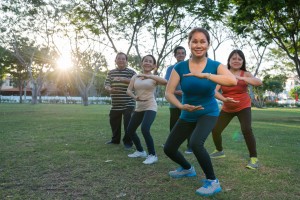

 Knee osteoarthritis, the leading cause of pain and disability for seniors, is a condition in which the cartilage between the bones – the cushion – slowly wears away, allowing the bones to rub together. There is currently no cure for knee osteoarthritis, but there are medications and therapeutic techniques that can help you gain your mobility and life back.
Knee osteoarthritis, the leading cause of pain and disability for seniors, is a condition in which the cartilage between the bones – the cushion – slowly wears away, allowing the bones to rub together. There is currently no cure for knee osteoarthritis, but there are medications and therapeutic techniques that can help you gain your mobility and life back.
If you have joint pain, you probably think you’ve tried it all by now – pain medications, injections, hot and cold packs, etc. But there is probably one technique you have yet to try, and it could be the one that may finally offer you some sort of relief from your painful joints.
If you haven’t heard of tai chi, let us explain. Tai chi is an ancient Chinese meditation practice that combines slow breathing with fluid movements. Tai chi has gained popularity as a form of exercise and stress reliever, as it is gentle enough for all fitness levels.
A study randomly assigned 200 participants with knee osteoarthritis to either tai chi or physical therapy. Both groups experienced similar results in reducing the pain associated with knee osteoarthritis, but those in the tai chi group demonstrated greater improvement in wellbeing and mental health, compared to those in the physical therapy group.
The findings suggest that not only is tai chi beneficial for musculoskeletal conditions, but it could benefit mental health as well.
Lead study author Dr. Chenchen Wang said, “Tai chi is a multicomponent traditional Chinese mind-body practice that may systematically promote health . . . by integrating physical, psychosocial, emotional, spiritual, and behavioral elements.”
Getting seniors to exercise is a pressing issue, as the growing research evidence reveals the dangers of a sedentary lifestyle. But many seniors may not be able to partake in exercise or other activities due to pain resulting in faulty joints. Tai chi then allows for these individuals to start moving slowly while improving their condition so they can work their way up to more activity.
Romy Lauche of the Australian Research Center in Complimentary and Integrative Medicine at the University of Technology Sydney added, “Finding effective and safe interventions is a top priority… Any kind of exercise including tai chi may benefit patients by improving functional disability, and they also impact coping skills.”
Controlled movements, like those found in tai chi, may benefit joints because they allow the fluid to be released from the joints, in and out of the cartilage, all the while improving flexibility. Furthermore, many tai chi practices may occur in public settings like parks, turning into a social activity as well.
If you’re living with joint pain or knee osteoarthritis, you may want to look up tai chi classes in your area as an effective means of not only improving your joints but your overall wellbeing, too, as that can go a long way to improve your health.
Heart patients benefit from tai chi
Heart disease patients benefit from performing tai chi exercises as reported by a new study. The study reviewed 35 previous studies, which included over 2,200 individuals from 10 different countries. The researchers found that those with heart disease benefitted from tai chi, as their blood pressure lowered along with their cholesterol and other heart-related factors. Continue reading…
Tai chi improves physical capacity in certain chronic conditions
A study published in the British Journal of Sports Medicine revealed a link between tai chi and improved physical capacity among seniors with certain chronic conditions. The findings showed improvement among those with breast cancer, heart failure, osteoarthritis, and chronic obstructive pulmonary disease (COPD). Continue reading…
Source:
http://www.reuters.com/article/us-health-taichi-knee-arthritis-idUSKCN0Y82LC
Copyright © www.orthopaedics.win Bone Health All Rights Reserved